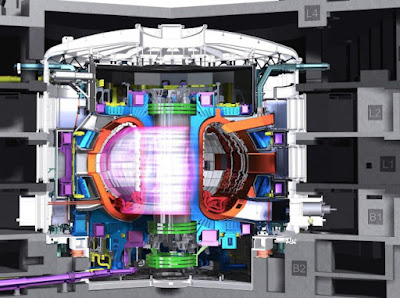Experts: fusion reactors "economically viable"
Experts: fusion reactors "economically viable" - Economically viable fusion reactors could start generating electricity in a few decades, and politicians should start planning their construction as a replacement for conventional nuclear power plants, experts say.
Scientists at the University of Durham and the center of the Culham in Oxfordshire fusion energy re-examined the synthesis of economy, taking into account recent advances in the technology of superconductors. Their analysis of the construction, operation and decommissioning of nuclear power plants Synthesis shows the financial feasibility of fusion energy as compared to conventional nuclear power based on fission.
The study, published in the journal Fusion Engineering and Design, based on previous findings that the synthesis plant can produce electricity at a reasonable price of the plant division, and brings new benefits in the use of new superconducting technologies.
Damian Hampshire professor of the Center for Materials Physics, Durham University, leading the research, said: "Obviously, we can only speculate, but our forecast implies that the synthesis is not significantly more expensive than the division."
These findings support the possibility that a generation or two synthesis reactors can offer almost unlimited supply of energy that is not paired with the worsening problem of global warming, or the production of harmful products on a large scale.
Fusion reactors produce electricity, heat the plasma to 100 million degrees Celsius, so that the hydrogen atoms are fused together, releasing energy. This process differs from the nuclear fission reactors, which works by splitting atoms at lower temperatures.
Fusion reactors advantage over current fission reactors is that they hardly produce radioactive waste. Synthesis reactors safer, because there is very radioactive material that can leak into the environment, and with it, possible disasters and accidents like Fukushima or Chernobyl, since the plasma simply running out in the event of leakage.
Fusion energy and political security, as the fusion reactor will not produce weapons-grade products, encouraging the creation of nuclear weapons. Synthesis reactor fueled with deuterium, or heavy water, which is extracted from seawater, and tritium, which is created inside the reactor, so that problems with security of supply will not be.
ITER experimental fusion reactor will start to work after 10 years in the south of France. His task - to prove the scientific and technological feasibility of fusion energy production.
Professor Hampshire hoped that this analysis will help in the development of the political doctrine about fusion reactors and attract private sector investment.
"Synthesis, division, or the burning of fossil fuels - is the only practical possibility of large-scale energy production. Calculate the cost of a fusion reactor is difficult, given the variations in the cost of raw materials and exchange rates. But it is a step in the right direction. We knew about the possibilities of fusion reactors for many years, but many people simply do not believe that they will ever be built due to the technological challenges that must be overcome, and the uncertain costs. "
Although there are still some technological challenges to be overcome, experts already have strong arguments, based on the best available evidence, in favor of the synthesis plant can be economically viable.
Scientists report prepared as part of the energy program of the Research Council of the UK, focused on the latest achievements in the field of high-temperature superconductors. These materials can be used to build powerful magnets that hold hot plasma inside the container, known as a tokamak, in the heart of a thermonuclear reactor. Technology development suggests that the superconducting magnets can be built in parts, but not in one piece. Consequently, the service, which is very expensive in the radioactive field, will be cheaper, because some parts of the magnet can be removed for repair or replacement without disassembling the entire device.
While the analysis considers the cost of construction, operation and decommissioning of the thermonuclear power plant, it does not take into account the costs of disposal of radioactive waste associated with nuclear reactor. In the case of a fusion reactor, the only radioactive waste will be a tokamak after the write-down, the degree of radioactivity during the period of operation will also be low.

0 comments:
Post a Comment